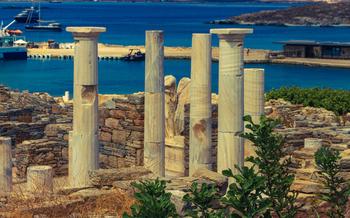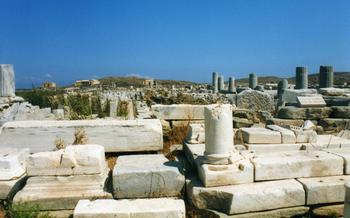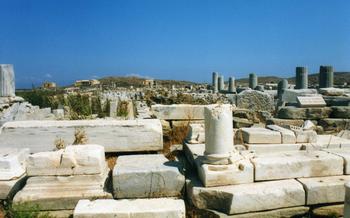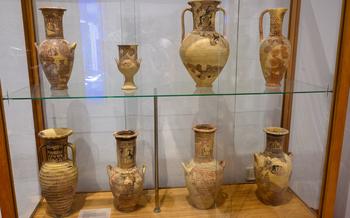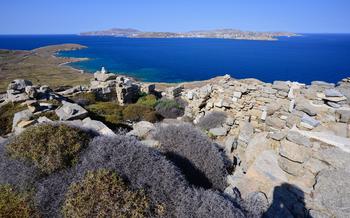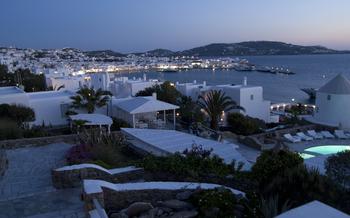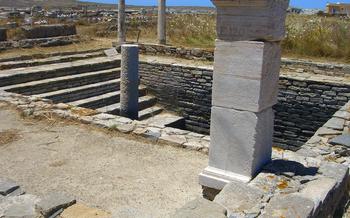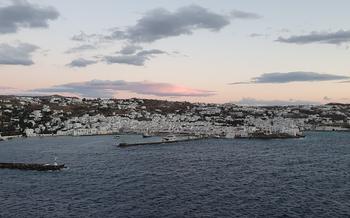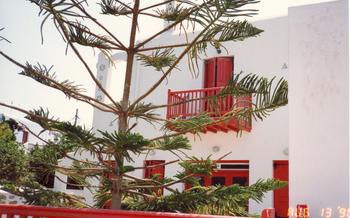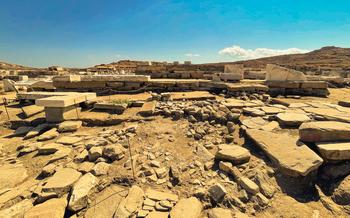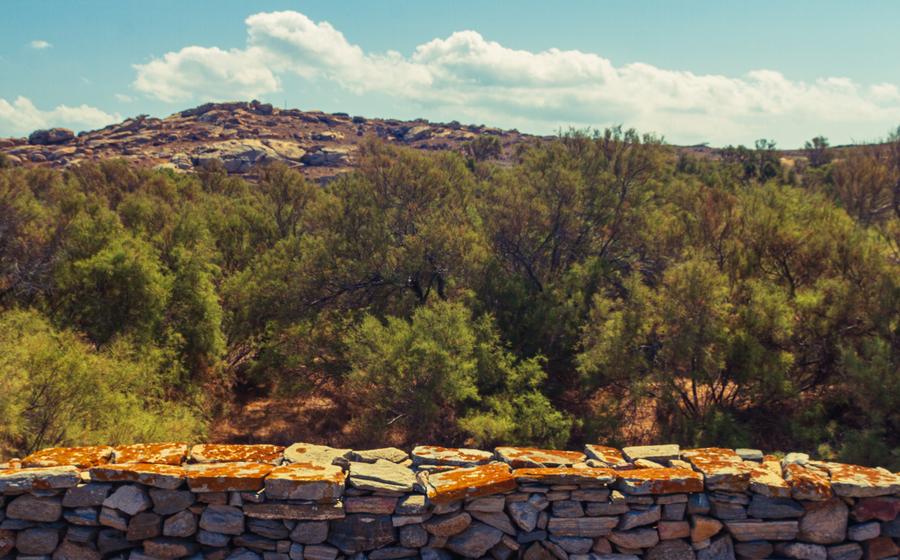
Sacred Lake at Delos
- Delos, the Sacred Island of Myth and History:
- Journey to Delos
- Unveiling the Sacred Lake
- Exploring the Archaeological Site
- Unraveling the Terrace of the Lions
- House of Dionysus: A Glimpse into Ancient Luxury
- Sanctuary of Apollo: Center of Ancient Worship
- The Theater of Delos: A Stage for Ancient Performances
- The Archaeological Museum of Delos: A Treasure Trove of Artifacts
- Tips for Visiting Delos
- Capturing the Beauty of Delos
- Local Cuisine and Dining Options
- Shopping for Souvenirs
- Insider Tip: The Sacred Lake at Sunset
Delos, the Sacred Island of Myth and History:
In the heart of the Aegean Sea, nestled among the Cyclades islands, lies the sacred island of Delos. Steeped in ancient mythology and historical significance, Delos holds a unique place in the annals of Greek civilization. According to legend, this barren and rocky isle was the birthplace of the radiant twins, Apollo and Artemis, children of Zeus and Leto. The island's mythological origins imbued it with a profound sense of sanctity, attracting pilgrims and worshippers from across the Hellenic world.
In addition to its mythological significance, Delos also emerged as a prominent religious and commercial center in ancient Greece. During the Archaic period, the island served as a sanctuary for the Ionian League, a confederation of Greek city-states. Temples and altars dedicated to Apollo and Artemis were constructed, transforming Delos into a sacred pilgrimage site. The island's strategic location at the crossroads of major trade routes further contributed to its prosperity, as merchants and traders flocked to its shores.
Today, Delos stands as a testament to its glorious past. Its archaeological treasures, including the Terrace of the Lions, the House of Dionysus, and the Sanctuary of Apollo, have earned it a well-deserved place on the UNESCO World Heritage list. Delos offers visitors a glimpse into the rich tapestry of ancient Greek culture, religion, and history, inviting them to explore the birthplace of gods and unravel the secrets of a sacred island.
Journey to Delos
To embark on a journey to the sacred island of Delos from the vibrant shores of Mykonos, a variety of ferry options await eager travelers. Ferries depart from the picturesque Mykonos Town harbor, offering a scenic voyage across the shimmering Aegean Sea. Schedules vary depending on the time of year, but ferries typically operate multiple times a day, ensuring convenient access to the ancient sanctuary.
Ticket prices range from approximately 15 to 25 euros for a one-way journey, and round-trip tickets offer a slight discount. Advance booking is recommended, especially during peak tourist season, to secure your spot on the ferry and avoid any disappointment. Several reputable ferry companies operate the Mykonos-Delos route, including Hellenic Seaways, Sea Jets, and Golden Star Ferries.
The ferry journey itself takes approximately 30 to 45 minutes, providing ample time to relax and soak in the breathtaking views of the surrounding islands and the deep blue waters of the Aegean. As the ferry approaches Delos, the island's rugged coastline and archaeological treasures gradually come into view, promising an unforgettable encounter with history and mythology.
Unveiling the Sacred Lake
Within the archaeological site of Delos, near the Sanctuary of Apollo, lies a captivating natural wonder known as the Sacred Lake. This serene body of water holds immense significance in ancient Greek mythology and rituals. According to legend, the lake was formed when Apollo, the god of light and music, killed the monstrous serpent Python and buried its remains beneath the earth. The lake's waters were believed to possess purifying properties, and pilgrims would bathe in them before entering the sacred precincts of the sanctuary.
Excavations conducted around the lake have unearthed fascinating artifacts that shed light on its ancient significance. Remains of altars, statues, and other offerings suggest that the lake was a site of religious ceremonies and rituals. The discovery of a marble statue of Artemis, Apollo's twin sister, further reinforces the lake's connection to these deities.
Exploring the Archaeological Site
Beyond the Sacred Lake, Delos boasts an array of other significant ruins and monuments that offer a glimpse into its rich past. The Terrace of the Lions, a majestic ensemble of marble sculptures, stands as a testament to the island's former grandeur. These imposing lion statues, arranged in a row atop a monumental terrace, once guarded the sacred precinct of Apollo. Their weathered expressions and intricate details invite visitors to ponder their symbolic meaning and the stories they could tell.
Strolling through the archaeological site, one can marvel at the well-preserved House of Dionysus, a testament to the opulence of Delos's elite during the Hellenistic period. The house features exquisite mosaics depicting scenes from Greek mythology, offering a vibrant glimpse into the lives of its former inhabitants.
The Sanctuary of Apollo, the religious heart of Delos, is another must-see attraction. Here, visitors can explore the temple, altars, and other sacred structures that once hosted grand religious festivals and ceremonies. The sanctuary's imposing presence and intricate architectural details provide a tangible connection to the spiritual devotion of ancient Greeks.
Finally, the Theater of Delos stands as a testament to the island's cultural significance. This well-preserved theater once hosted religious festivals, musical events, and theatrical performances, providing entertainment and inspiration to the ancient community. Its impressive acoustics and scenic backdrop make it an evocative venue even today, transporting visitors back in time to the era of ancient Greek drama.
Unraveling the Terrace of the Lions
Amidst the ruins of Delos, the Terrace of the Lions stands as a testament to the island's former grandeur. This iconic monument, dating back to the 7th century BC, features a row of majestic marble lions that once guarded the sacred precinct of Apollo. The lions, carved with exquisite detail, exude a sense of strength and power, their imposing presence symbolizing the might of the Delian sanctuary.
The Terrace of the Lions served as a processional way, where pilgrims and worshippers would ascend to the Temple of Apollo. The lions, aligned in a symmetrical row, created a grand entrance, enhancing the awe and reverence inspired by the sanctuary. Each lion is unique, showcasing the exceptional craftsmanship of ancient Greek sculptors. Their muscular bodies, intricate manes, and expressive faces convey a sense of realism and vitality that is simply breathtaking.
The terrace offers a panoramic view of the archaeological site, allowing visitors to appreciate the vastness and complexity of Delos. From here, one can gaze upon the ruins of temples, theaters, and other significant structures, all bathed in the warm Mediterranean light. The Terrace of the Lions is not just an archaeological wonder but also a symbol of Delos's enduring legacy as a sacred and revered place in ancient Greece.
House of Dionysus: A Glimpse into Ancient Luxury
Step into the House of Dionysus, a testament to the lavish lifestyle of Delos's elite during the Hellenistic period. This remarkably preserved residence showcases intricate mosaics that transport you back in time. Admire the vivid depictions of mythological scenes, including the triumphant procession of Dionysus, the god of wine and revelry. The vibrant colors and detailed craftsmanship offer a glimpse into the opulence and artistic prowess of Delos's ancient inhabitants. As you explore the various rooms, imagine the grandeur of feasts and celebrations that once took place within these walls. The House of Dionysus stands as a reminder of the sophistication and luxury that characterized Delos's golden age.
Sanctuary of Apollo: Center of Ancient Worship
The Sanctuary of Apollo, located at the heart of Delos, was the linchpin of religious life in ancient Greece. Dedicated to the god Apollo, the sanctuary served as a focal point for worship, pilgrimage, and religious festivals. The complex comprised several sacred structures, including the monumental Temple of Apollo, which housed a colossal statue of the god. Altars for offerings and sacrifices were scattered throughout the sanctuary, where devotees sought divine favor and guidance. The sanctuary was considered a sacred precinct, drawing pilgrims and worshippers from across the Hellenic world who came to pay homage to Apollo and seek his blessings.
The Theater of Delos: A Stage for Ancient Performances
Amidst the ruins of Delos, the ancient theater stands as a testament to the island's rich cultural heritage. Constructed in the 3rd century BC, the theater played a pivotal role in the religious and social life of the island's inhabitants. With a seating capacity of approximately 6,500 spectators, it hosted a variety of performances, including religious festivals, musical events, and theatrical productions.
The theater's impressive architecture is a sight to behold. Its well-preserved stone seats rise in tiers, offering a panoramic view of the surrounding landscape. The stage building, adorned with intricate carvings and sculptures, provides a grand backdrop for performances. The theater's acoustics are remarkable, ensuring that the voices of actors and musicians could be heard clearly throughout the auditorium.
During the annual festivals honoring Apollo, the theater was transformed into a sacred space. Plays and musical performances were staged to entertain and honor the god. The theater also hosted competitions between poets, musicians, and actors, attracting talented individuals from across the Greek world.
Today, the Theater of Delos stands as a silent witness to the vibrant cultural traditions of ancient Greece. Visitors can wander through its ruins, imagining the sounds of music and laughter that once filled the air. The theater serves as a reminder of the enduring power of the arts and their ability to bring people together in celebration and community.
The Archaeological Museum of Delos: A Treasure Trove of Artifacts
Delos's rich history and cultural significance are further showcased at the Archaeological Museum of Delos. This treasure trove of artifacts provides a fascinating glimpse into the island's past and the artistic achievements of its ancient inhabitants.
The museum houses an extensive collection of sculptures, pottery, jewelry, and other objects excavated from the archaeological site. Among the highlights are exquisite marble statues, intricately decorated pottery vessels, and delicate gold jewelry. These artifacts offer valuable insights into the artistic styles, religious beliefs, and everyday life of the ancient Delians.
One of the most notable exhibits is the Winged Victory of Delos, a magnificent marble statue that once adorned the Temple of Apollo. This iconic sculpture, dating back to the 4th century BC, epitomizes the artistic prowess of ancient Greek sculptors and is a symbol of the island's rich cultural heritage.
The museum also features an impressive collection of pottery from various periods, including Geometric, Archaic, and Hellenistic. These vessels, often adorned with intricate designs and mythological scenes, provide a glimpse into the daily lives and artistic traditions of the ancient Delians.
Visitors to the Archaeological Museum of Delos will be captivated by the sheer beauty and historical significance of the artifacts on display. This museum is a must-visit for anyone interested in exploring the rich cultural heritage of this ancient island.
Tips for Visiting Delos
Timing is Key: Aim to arrive early in the morning to beat the crowds and enjoy the site in relative peace. The island is at its most picturesque in the soft morning light, providing excellent photo opportunities. Alternatively, consider visiting in the late afternoon to experience the magical ambiance of the Sacred Lake at sunset.
Essentials for a Comfortable Visit: Delos is a largely unshaded island, so be sure to pack sunscreen, a hat, and sunglasses. Comfortable walking shoes are a must as you'll be doing a fair amount of walking on uneven terrain. A camera is a must-have to capture the island's stunning beauty.
Respect the Past: Delos is an archaeological site of immense historical significance, so it's important to be respectful and mindful of your surroundings. Avoid touching or climbing on the ancient ruins, and be sure to dispose of any trash properly.
Stay Hydrated and Nourished: While there are a few food and beverage options available on Delos, it's advisable to bring your own snacks and plenty of water, especially if you're visiting during the hot summer months.
Be Mindful of Others: Delos is a popular tourist destination, so be considerate of other visitors and keep noise levels to a minimum. This will allow everyone to fully appreciate the tranquility and historical significance of the island.
Capturing the Beauty of Delos
Delos, with its rich history and stunning landscapes, presents a photographer's paradise. Capture the essence of the island through your lens, from the picturesque ruins and monuments to the breathtaking views of the Aegean Sea. Explore the ancient streets and squares, capturing the intricate details of the architecture and the play of light and shadow. Zoom in on the exquisite sculptures and mosaics, preserving the artistry and craftsmanship of ancient Greek artisans. Don't miss the opportunity to photograph the Sacred Lake, a mystical spot that seems to shimmer with secrets. As the sun sets, the lake transforms into a canvas of golden hues, making for an unforgettable photo opportunity. Whether you're a seasoned photographer or an enthusiast, Delos offers countless moments to freeze in time and cherish forever.
Local Cuisine and Dining Options
Your journey through the ancient wonders of Delos can be complemented by a delightful culinary experience. While dining options on the island are limited, there are a few charming cafes and tavernas that offer a taste of traditional Greek cuisine.
Indulge in freshly caught seafood dishes, savoring the flavors of the Aegean Sea. Grilled octopus, succulent shrimp, and aromatic fish are popular choices that showcase the region's culinary treasures.
For a more substantial meal, try traditional Greek dishes such as moussaka, a flavorful casserole made with layers of eggplant, potatoes, and minced meat, topped with a creamy béchamel sauce. Another local favorite is pastitsio, a baked pasta dish with minced meat, béchamel, and a sprinkling of grated kefalotyri cheese.
As you savor these culinary delights, take in the breathtaking views of the ancient ruins and the sparkling sea. Dining in Delos is an opportunity to immerse yourself in the island's rich history and culture, creating lasting memories that go beyond the archaeological wonders.
Shopping for Souvenirs
Shopping for Souvenirs:
As you wander through the ancient streets of Delos, you'll encounter charming shops and stalls offering a treasure trove of souvenirs to commemorate your visit. These souvenirs serve as tangible mementos of your journey into the heart of Greek history and mythology.
From intricate replicas of ancient artifacts to handcrafted jewelry inspired by the island's rich past, there's something for every taste and budget. Consider purchasing a miniature statue of Apollo, the god of music and prophecy, or a delicate necklace adorned with a replica of a Minoan seal.
Whether you seek a small token of remembrance or a unique piece of art, the shops of Delos offer a delightful array of souvenirs to transport you back to this sacred island whenever you gaze upon them.
Insider Tip: The Sacred Lake at Sunset
As the sun begins its descent, casting a warm golden glow across the ancient ruins of Delos, the Sacred Lake transforms into a mystical oasis. The tranquil waters shimmer with a mirror-like reflection of the sky, creating an ethereal ambiance that transports you back in time.
For a truly unforgettable experience, find a secluded spot near the lake and witness the sunset's enchanting display. As the sky transitions from vibrant hues of orange and pink to a deep indigo, the ancient stones and sacred structures seem to come alive with an otherworldly aura.
Capture the magic of this moment with your camera, ensuring you have a memento of this extraordinary spectacle. The Sacred Lake at sunset is not just a sight to behold; it's an experience that will linger in your memories long after you bid farewell to the sacred island of Delos.
